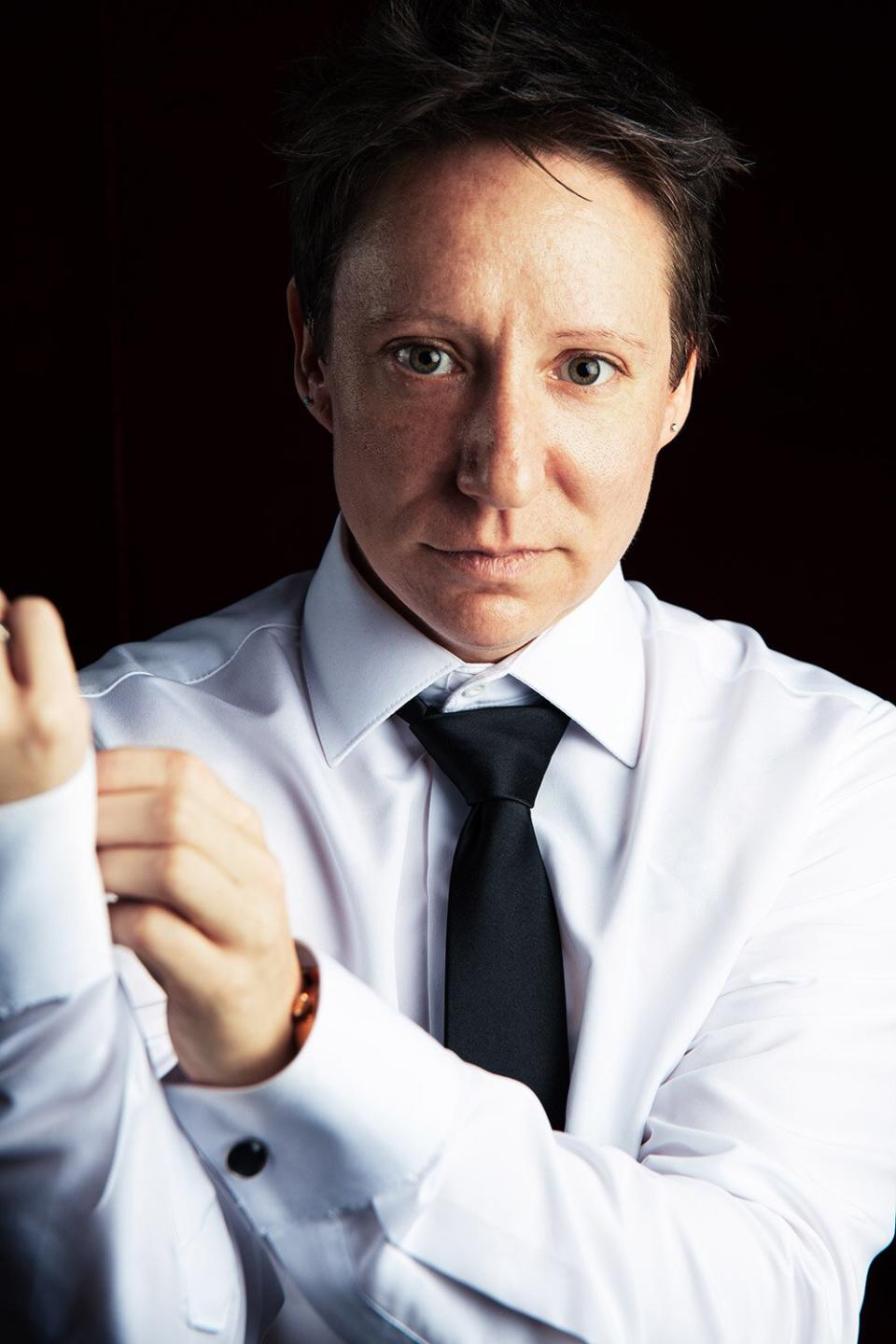Mastering Engineer Emerson Mancini Says a Kendrick Lamar Song Led Him to Share His Trans Identity

saul moreno Emerson Mancini
Emerson "Em" Mancini is ready to share his story.
The Grammy-winning mastering engineer, known for his work on music by Camila Cabello, Halsey, Charlie Puth and other artists, came out as a transgender man in an open letter via Billboard on Friday. Ahead of its publication, Mancini (who uses both he/him and they/them pronouns) spoke to PEOPLE about his journey and how a session for Kendrick Lamar's latest album inspired him to share it with the industry and beyond.
Growing up, Mancini recalls moments of feeling uncomfortable as female gender norms became prevalent in his life. "Hitting puberty was really awful, but I didn't really know why. Other people were excited — I was not," he tells PEOPLE. Questions about possibly identifying as transgender didn't enter his mind until he was studying music production at Berklee College of Music, but "the answer was always 'No,' for lots of invented reasons," remembers the self-described introvert.
Surrounded by a flurry of LGBTQ-identifying friends, however, Mancini dove head-first into literature about queer experiences, particularly connecting with the works of non-binary author Kate Bornstein. "I was searching for answers without knowing why, and I was in a really big state of denial," he explains, noting that peers often brushed off his questions about identity, leaving him to do his own research. "The only place I found comfort was in a lot of those books."
RELATED: Camila Cabello Launches Protect Our Kids Fund in Response to Florida's 'Hateful' 'Don't Say Gay' Law

saul moreno Emerson Mancini
Since graduating in 2008, Mancini has worked as a mastering engineer, receiving music from artists after it's been recorded and mixed and creating the final audio formats that get released onto streaming services and make their way to listeners' ears. For more than a decade since first questioning his identity, Mancini avoided coming to terms with it and instead, he says, "I just put my head down, and I worked."
When the #MeToo movement swept the entertainment industry around 2017, as one of few female-presenting individuals in his field at the time, Mancini found himself uneased with being lumped into initiatives to highlight women in the music engineering world. "I was always trying to kind of erase my gender," he says. "I felt uncomfortable being placed in that category." But the complete picture of their identity wasn't yet formed.
Focusing on his professional life worked for a while, as he master-engineered high-charting songs by A-list musicians on the regular. Though once the COVID-19 pandemic hit in March 2020, Mancini found the time to answer the questions that had been floating around his head for years: "I had the space then to sit down and ask myself, 'What do I want? What makes me happy?' And not even just in terms of my own identity, but just, 'How do I function in society?'"

saul moreno Emerson Mancini
Spending time in lonesome solace led Mancini to have deeper conversations about identity with a couple of close friends. By the end of 2020, he realized he was transgender and quickly decided to get top surgery. "That was the first thing that needed to go, and that gave me a lot of space and freedom to operate," he says.
Following the procedure, Mancini felt a wave of relief — shortly followed by struggles to view their newly modified body, let alone show it off in personal or romantic settings. "You never realize how deeply ingrained societal expectations are until you start pushing against them," he details. "That's when it becomes really apparent that it's a journey. It's not a destination. You can't really get from A to Z without going through the rest of the alphabet."
Throughout 2021, Mancini read headlines about Florida's "Don't Say Gay" law and anti-transgender legislation sweeping the southern United States and began to feel enraged. He experienced urges to come out in many heat-of-the-moment instances but ultimately decided he wanted to discuss his identity with close friends and family before telling the world.
RELATED: Kendrick Lamar Talks to Young Concertgoer, Gives Him Inspiring Letter: 'You Will Forever Be Great'
Then, at the beginning of this year, Mancini was in the midst of mastering Lamar's Mr. Morale & the Big Steppers album when he heard "Auntie Diaries," a song about the 35-year-old rapper's experience learning his aunt was transitioning from female to male. Lamar's team was coming into his studio within the hour to check his progress, but hearing the rapper describe his flawed journey from ignorantly using anti-LGBTQ slurs to celebrating his relative's identity left Mancini in "shock."
"I thought that was a really powerful way to not only tell a story about one person, but I think it reaches an audience that might not have understood and gets them to a place where they do by the end of the song," explains Mancini. "I appreciate the song for giving us insight into an understanding and an enlightening moment — in all of its imperfections, especially."
Never miss a story — sign up for PEOPLE's free daily newsletter to stay up to date on the best of what PEOPLE has to offer, from juicy celebrity news to compelling human interest stories.
In order to keep the meeting professional, Mancini didn't bring up his identity. But after finishing his work on Lamar's album, he worked up the courage to email the rapper's team and share his own story, which marked his official coming out to anyone in his industry. "I actually had to call my friend and say, 'Will you make me hit send? Because I don't know if I can do it,' which is funny now because I've hit send on so many more of those emails since then," he explains, noting that his parents have been "really supportive."
Almost immediately, Mancini received a wave of support from longtime industry colleagues, all of whom quickly began calling him "Em," a nickname they chose while transitioning out of their dead name, Michelle. "It took me my entire life to get to this moment, and then I send one email and everyone's like, 'Yep! OK. Sure, no problem,'" he recalls. "It was really an astounding experience."

saul moreno Emerson Mancini
Despite not receiving Mancini's email directly, Lamar himself caught wind of the engineer's story and reached out to show his support. "He was really appreciative that I had gotten so much out of something he did," he recalls. "He connected with the vulnerability that it took to come out. That was really special."
Since coming out to select industry peers, he's only received "warmth," with one record label staffer even taking the initiative to begin re-crediting some of his works to Emerson Mancini. He's not yet decided whether or not to change his legal name, but after earning a Grammy award for mastering Jon Batiste's We Are album earlier this year, he's feeling an itch to be correctly credited. "Not that it matters, but it would be cool," he says.
Mancini feels understandably "terrified" while gearing up for his widespread coming out. After all, he's never been a public person and isn't looking to be. "I picked this side of the glass on purpose," he says, referring to his recording studio position.
Choosing to publicize his identity comes from the desire to not have to continue coming out person-by-person, which becomes "exhausting," as well as the hope to inspire others to live their truth. "If I can make one person in the world that I don't know feel better, feel less alone, feel that there's hope or be less scared, that's worth a thousand times whatever discomfort I have."

 Yahoo Movies
Yahoo Movies 
